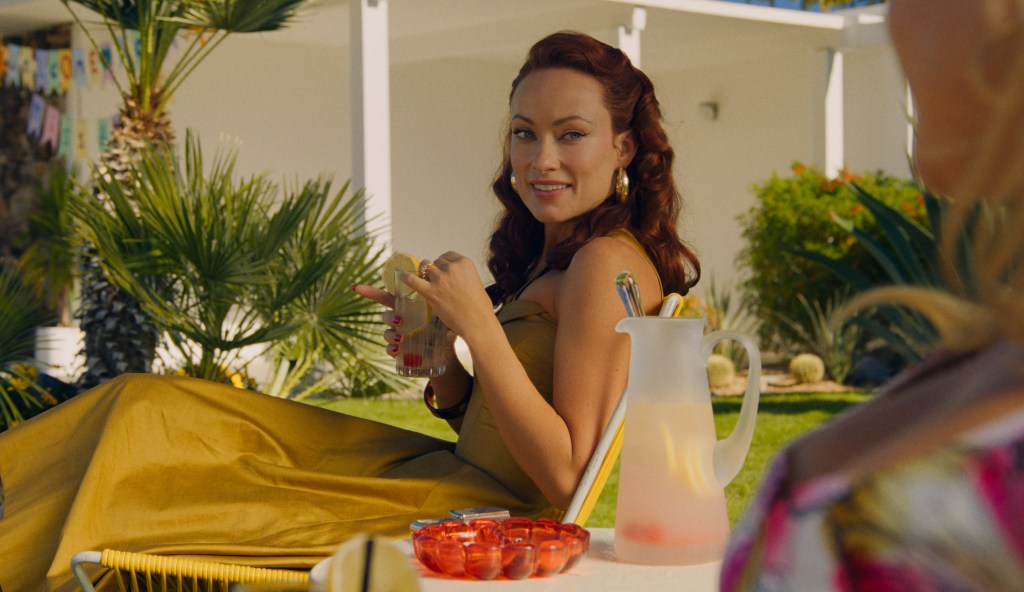Don’t Worry Darling Ending Explained
Let’s dig into the mystery behind Olivia Wilde’s psychological thriller, Don't Worry Darling.

This article contains spoilers for Don’t Worry Darling.
In Olivia Wilde’s second feature film as a director, Don’t Worry Darling, Florence Pugh and Harry Styles star as Alice and Jack Chambers, a young couple who live in a 1950s planned community called Victory. Jack goes to work in the morning, like every other man in town, and participates in the mysterious Victory Project. All of which is overseen by the equally mysterious Frank (Chris Pine), a charismatic cult leader type who built the whole place.
Alice, like every other woman in town, stays home to clean, cook, and prepare for her husband’s return home—which in the case of Alice and Jack, often results in lusty, vigorous sex. She also finds time in the afternoon to shop, go to dance class, and gossip with her next door neighbor, Bunny (Wilde).
When Alice, however, begins to experience strange visions and is haunted by the apparent death of another neighbor, her friend Margaret (Kiki Layne), she also starts to realize that something is amiss in Victory. Jack and her friends try to wave it off as exhaustion or illness, but Alice becomes more and more convinced that something dark lurks at the heart of Victory. Which brings us to the ending of the film.
What is the Victory Project?
As far as most of the wives of Victory are concerned, the Victory Project is located on a hilltop in the desert just outside of town, and its ostensible mission is the “development of progressive materials.” Every single man in town goes to work at the project every day, under the leadership of Frank. Everything in Victory revolves around the Project, which no one can talk about, and every need of the inhabitants of Victory is taken care of through it.
The reality, however, is vastly different. The Victory Project is in fact a digital simulation created by intricate virtual reality. The town of Victory and everything associated with it exists inside this simulation, which is implanted into the minds of the town’s female inhabitants via a combination of drugs and technology. In the real world, the men of Victory have hypnotized their wives, partners, or significant others with Frank’s tech, leading the women to believe they live in the idealized world of the simulation.
We learn all this after a dinner party that goes awry, as Alice begins to question Frank about the strange things she’s seen, the disappearance of Margaret, and other anomalies in the town. Jack is humiliated and upset, while Frank’s wife Shelley (Gemma Chan) defends her husband and castigates Alice in the strongest possible terms.
When everyone is gone, Alice begs Jack to leave Victory with her, and at first it seems like he agrees. But it’s only a ruse to get her outside to the car where Victory Project operatives in red jumpsuits take her away. She is brought to the hospital, where the malevolent Dr. Collins (Timothy Simons) gives her extensive shock treatment. While she is under, the memories of her real life come briefly flooding back and we learn how she and Jack ended up in Victory…
Why Does Jack Brainwash Alice
In the real world, Jack and Alice live in a shabby apartment in a rundown part of town. Alice works as a doctor and is clearly the main breadwinner in the household. Jack… well, we don’t know what Jack does, but his hair is longer and greasier, he looks unkempt, and he basically sits home all day on his computer. In other words, Jack is sad.
We catch a quick glimpse of Jack looking at the Victory Project’s website and listening to a speech by Frank, which first alerts us to his growing interest in the latter’s agenda. As we discover, Jack is not happy that Alice works long shifts to pay the bills (even though she loves her job), and he’s equally upset that she is too tired to make dinner or give him sex when she does come home.
So he becomes drawn toward joining the Victory Project. We don’t see how he first traps his wife in this VR hell, but we have to assume that he drugged her and must keep drugging her daily to keep her trapped in the tech. We are later told that all the men are responsible for “taking care of their wives” (although it is horrifically suggested that some of the women in Victory are randomly supplied by the project since Jack chose to supply his “own wife”). Upkeep would presumably also include feeding and even putting wives into diapers. But again, the movie glosses over the messier details.
Jack later rationalizes to himself and Alice (when she learns the truth) that this is somehow all for her, that she is overworked and needs a better life… that they need a better life. Frank’s answer, trapping women in a simulated “perfect” male-dominated world while depriving them of their real lives, appeals to Jack. Alice is understandably outraged that he would take away her agency, her life, and her ability to make her own choices.
When the men in Victory go to “work,” they exit the simulation themselves and go back to whatever they do in the real world—in Jack’s case, he has to earn money to pay Frank to remain in the simulation, although we don’t know exactly what that job is. And he takes care of Alice, her physical being, anyway, who lies hypnotized on their bed, hooked up to a machine, her mind perpetually in Victory.
What Happens When Alice Goes Back to Victory?
After the shock treatment seemingly resets Alice’s mind and wipes her memories of her real life, she returns to Victory, seemingly happy and back to normal. She is cooking and cleaning at home, wearing her glamorous little dress, and waiting for Jack to get back from work. But when he gets home, he begins humming a song that triggers Alice’s memories again, and they come flooding back.
This time she’s done with Victory for real, and she intends to leave. She and Jack struggle, and she smashes a glass over Jack’s head, which for some reason kills him (we also learn that if you die in Victory, you die in the real world, although it’s not clear why that happens since Victory isn’t real). Bunny enters the house, sees what has happened, and tells Alice she has to run before they come and get her, which will almost certainly mean her death. Bunny, you see, has always known the truth.

Why Does Bunny Stay?
While we don’t get to know Bunny very well, she certainly comes across as a queen bee of the wives and the central information hub for all the local gossip. She is also fiercely supportive of their lifestyle in Victory, which makes it all the more inexplicable that she has known all along what Victory really was.
Even stranger, at least at first, she doesn’t want to leave with Alice, even though the latter begs her to. In fact, we learn that Bunny is in Victory by choice because she can be with her two young children, or simulations of them anyway. In the real world, her children are apparently dead, and she’d rather live in a fantasy with them than with the cold hard reality.
This short, poignant moment at least turns Bunny into something more than just a shallow Victory wife, as does her decision to encourage her best friend Alice to escape. But, like so many other things in Don’t Worry Darling, it also brings up questions that are never explored. How did she find out about Victory? Do other members of the community have family members who are dead in the outside world but resurrected in the simulation? We know why Bunny stays. Is she the only one?
What Happens at the End?
Jack is dead, and Bunny is telling her to go, so Alice leaves the house, her dress covered in Jack’s blood. The other neighbors gather around in shock, but then something strange seems to happen. As Alice locks eyes with the other women, they seem to suddenly begin to awaken to what is really happening, and what Victory is.
How this happens is, again, rather unclear, and it reaches a truly ludicrous crescendo when we cut to Frank’s house, where Shelley abruptly stabs him in the torso with a large knife. “It’s my turn,” she hisses in one of the script’s most incoherent moments. This is the woman we just saw vigorously defending her husband three scenes earlier. It certainly appears that she’s in on the whole plan with him. So why does she suddenly slaughter him? Gemma Chan should be insulted by how badly written her character is.
Alice escapes in a car, with the red jumpsuit guys, Collins, and some of the husbands in pursuit. She heads out to the desert and Victory HQ. Her last visit there saw her touching the door of the building and then waking up in her bed. Was her simulated self rebooted? Perhaps the writers don’t even know.
This time, after causing Collins and some of the men to die in a car crash, she climbs the hill—hordes of red jumpsuits in pursuit like a knockoff of old self-replicating Agent Smith from The Matrix—and makes it to the door. This time, she’s able to leave (we don’t see how, exactly), and as the screen goes black, we hear her take in a breath, (presumably as she wakes up next to her dead hubby) back in her own life again.
The premise of Don’t Worry Darling will be completely familiar to anyone who has watched a few sci-fi movies in their lives. Certainly The Stepford Wives is a heavy influence here, with Get Out, the aforementioned The Matrix, a bit of Westworld, and the famous “San Junipero” episode of Black Mirror all trafficking in the same ideas.
Don’t Worry Darling telegraphs all this right from the beginning. We know there’s something off in Victory just a few minutes into the movie. It’s hard to understand why things start falling apart for Alice and why she begins to awaken to the truth. We’re not lulled into a seemingly normal reality, as in The Stepford Wives or Get Out, before the cards are laid on the table. There’s no tension as a result.
Even if you play along – and Pugh and the design of the film alone carry the picture for the first hour or so – the twist and the film’s message are both heavy-handed and flat at the same time. Yes, Olivia Wilde, men want to control women and their bodies. We know that. Tell us something new about that, or tell it in a new way, not in a script that comes apart at the seams. We’ll continue to watch Olivia Wilde’s career with interest, but after all the hoopla, Don’t Worry Darling is no victory.
Don’t Worry Darling is in theaters now.
